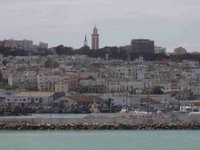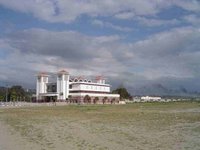was quite taken with that idea. The important man with the stamp appeared, though, and we presented ourselves for identification. In a few moments we were legitimate entrants.
 Tangier! The Avenue d'Espagne. It's a big, dusty boulevard lined with colonial buildings, many of them now converted into cafes, where all manner of men sat drinking mint tea or small cups of black coffee. On the broken pavements and the crumbling steps more men, in greasy suits and grubby shirts, lounged or walked about in little animated groups. Deals were being done all around, bargains struck, compromises made. Into all of this walked Mel and Faith, eyes wide
Tangier! The Avenue d'Espagne. It's a big, dusty boulevard lined with colonial buildings, many of them now converted into cafes, where all manner of men sat drinking mint tea or small cups of black coffee. On the broken pavements and the crumbling steps more men, in greasy suits and grubby shirts, lounged or walked about in little animated groups. Deals were being done all around, bargains struck, compromises made. Into all of this walked Mel and Faith, eyes wideand innocent as lambs. We had booked a room at the Continental Hotel before leaving Spain (used by Morocco newbies and ageing hippies, the guide said), and we knew vaguely how to find it. "Leave Avenue d'Espagne and bear right around the CTM building. Follow the edge of the medina and the frequent signs." We plunged in. Once we were out of the main Avenue d'Espagne we'd travelled back in time. A narrow street, tiny shops, dark inside, the smell of open drains mingling with the aroma of meat being cooked on charcoal, men and women in djellabas, craftsmen carving wood and cutting tiles for mosaics. The medina wall was on our right and we walked under an arch to a fork in the street. We couldn't see anything to our left or right but there, above our heads was an old sign that pointed to the right fork and read, "Hotel Continental 50 m". At a turn in the street a doorway appeared on the left and a gate on the right. From the doorway a man smiled. His invitation was warm and sincere in spite of his slightly distant gaze, "You want to buy a smoke?". On the right was a gateway. We chose the
gateway. Across a patio looking out over the port, we entered the Hotel Continental. The reception area was dark, cool and quiet. The Moroccan receptionist's French accent and his suit were impeccable, but both were of an earlier era. We looked around us at the mosaic walls and the Moorish arches. Ornate glass light fittings hung over the wide staircase and the corridors were lined wth cedarwood furniture, chests and paintings of the city as it might have been under French colonial control. The first thing we were asked for was the entry number on our passports. Only then were we allowed to book in.

Our room was furnished with an ornate wardrobe and bed, both with carved decoration and mirrors. The bathroom was enormous, and reached via a corridor in the room. All of this, though, was gloriously faded. The floor tiles were cracked, the furniture, though grand, was battered, rust was beginning to show through the bath enamel and the bedsheets, though clean and crisp, were well patched. Our window looked out over the port and the tumble of houses and roof terraces that cling to the edge of the medina. What a place! If you have a copy of "Casablanca", now is a good time to refer to it. We had two things to attend to immediately. Firstly, we needed cash to pay the hotel bill because they didn't accept cards; secondly, we needed to book our ticket for the overnight train to Marrakech next day. The Hotel couldn't help us with the train, and the receptionist wasn't sure where to find the station; we decided to find the Office de Tourisme and set off. A passing man asked us where we wanted, and we told him. "Follow me." He marched on ahead and , well, we followed. He led us by the most direct route (this included a brisk walk through some semi-derelict flat blocks where, once again, groups of men stood talking or waiting for something to develop). The Office de Tourisme was closed, but the man held out his hand and got a couple of Euros, which, we discovered later, he'd probably sell to someone leaving the country in exchange for their Dirhams. Because you're not allowed to take ANY dirhams out of Morocco. We found an ATM soon after this, and hailed a petit taxi to the railway station, which is about 3km from the city centre.

The station is impressive. It's brand new, all marble and chrome, floodlit and stands totally alone on a piece of wasteland where there's building rubble, discarded household goods, sheep and goats, shepherds and goatherds and a river whose grey water is almost solid enough to walk on. It was at the station that we discovered that no-one in Morocco accepts cards or anything but cash. We did a quick calculation and got enough money out of the ATM at the station (ATMs are everywhere;an interesting paradox) to buy First class sleeper returns from Tangier to Marrakech. These cost a total of 1114dH (about 111 Euros); rail travel is cheap in Morocco. We encountered a bustling local market on the way back into town. It was packed with people, all local, all wearing traditional dress. No visitors that we could see apart from us. We looked, mingled, bought icecream, felt confident we were getting to know Tangier, and set off to explore the medina like seasoned travellers. Somewhere out in the desert, laughter was heard as the djinns giggled at the credulity of these two presumptuous foreigners.

No comments:
Post a Comment